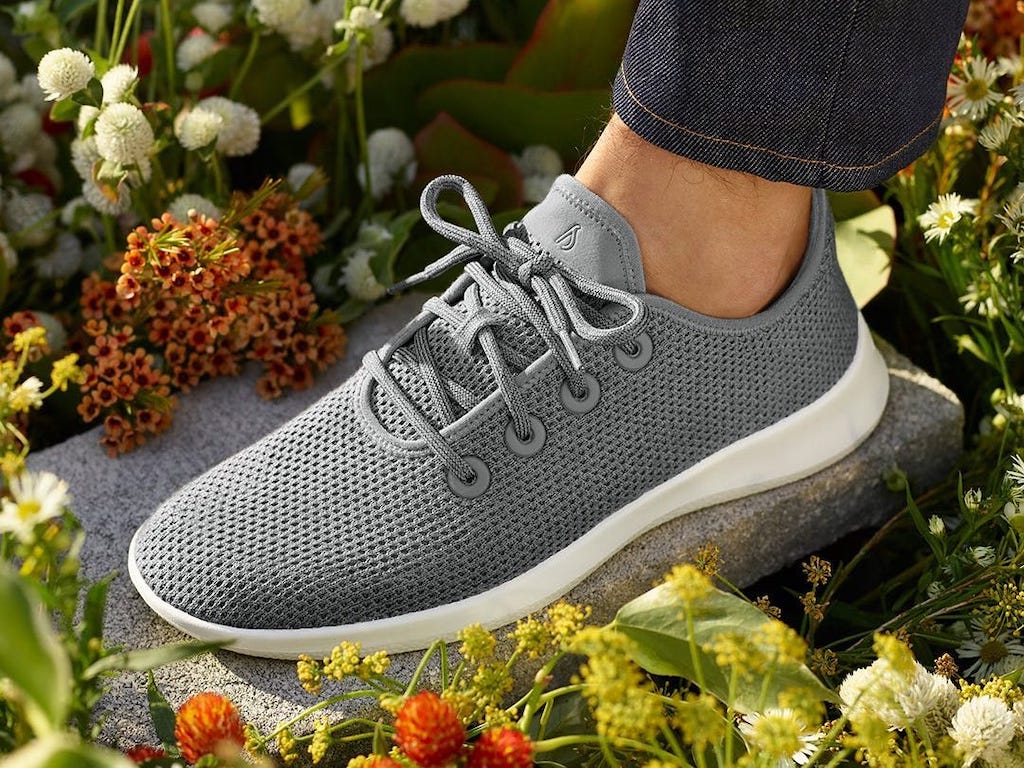3 Mins Read
New Zealand-American sustainable shoe brand Allbirds has begun offering a carbon footprint count for every shoe in its collection. It partnered with Los Angeles-based environmental consultancy firm Clean Agency to calculate the impact of each product, from production to use to end of life, and this information will be displayed on the brand’s website. It comes amidst the coronavirus pandemic, which has seen more consumers engaging with issues relating to sustainability.
Information about the carbon footprint of every sneaker in Allbirds’ collection of sustainable shoes will now be available to customers online on the brand’s website alongside other statistics about how it measures up against other industry practices. Launched in collaboration with Clean Agency, the San Francisco-based B-Corp carbon neutral footwear brand says that this is the first time for a fashion label to present its products with its environmental footprint numbers.
Compared to a standard pair of men’s running shoes made with synthetic materials, Allbirds’ version produces nearly less than half of the carbon emissions, according to its calculations.
Founded in 2014, Allbirds is known for its choice of natural materials such as eucalyptus tree fibre and sugarcane to create its iconic sustainable sneakers. Like businesses across almost every sector of the economy, Allbirds alongside other fashion labels have experienced a massive drop in sales due to the pandemic.
Its 18 stores globally have closed, and sales on e-commerce channels have declined significantly. But rather than resorting to slashing prices to attract more sales, the brand is committed to ensure employees full pay and using the time to up its consumer transparency about its eco-friendly operations.
The latest move to double-down on its green credentials is a part of the brand’s bet that consumers will have a greater interest in less wasteful consumption due to the coronavirus pandemic.
Consumers are now thinking more about health and wellness due to the pandemic, and are prioritising “health as it relates to taking care of themselves, and I think it will turn to how to take care of the world,” said co-founder Joey Zwillinger.
Indeed, according to the State of Fashion report by McKinsey & Co, the current “quarantine of consumption” as a result of the pandemic could help further the popularity of purpose-driven brands. In comments made earlier this year, renowned trend-spotter Li Edelkoort predicted that the pandemic will wake consumers up to the fact that unsustainable consumption is unnecessary, and greater calls will come for a better system that protects the planet and people.
Even prior to Covid-19, fashion companies had already been facing rising scrutiny over its environmentally damaging operations, from driving 10% of global carbon emissions to contributing a truckload of textile waste every second, not to mention water pollution and unethical working conditions in supply chains.
Fast fashion brands and luxury labels alike have gradually begun launching eco initiatives to retain consumers, leading to a sudden “explosion” in sustainable fashion over the past year, though many have been awash with criticisms for greenwashing.
“Consumers obviously care about sustainability. And a lot of companies use the word sustainability and don’t do anything and are just hoping to cash in on the marketing value,” said Zwillinger.
“We decided that to continue to push this conversation required us to be highly transparent…We need something so simple that everyone could look at it, just like the calories on a food label.”
The idea of using carbon footprint labels to explain to consumers the sustainability of a product has grown in recent months. In January, Quorn, the vegetarian and vegan meat substitute brand, launched new low-carbon food labels to show consumers how many emissions are saved by ditching conventional meat and dairy. Last year, digital company Wholegrain Digital launched a website footprint calculator for brands and users to find out how emissions-efficient each site is.
While Allbirds is the first brand to display its own footprint count on each of its products, consignment platform thredUP debuted earlier this year a Fashion Footprint Calculator to help consumers understand the impact of different fashion choices they make.
Lead image courtesy of Allbirds.




